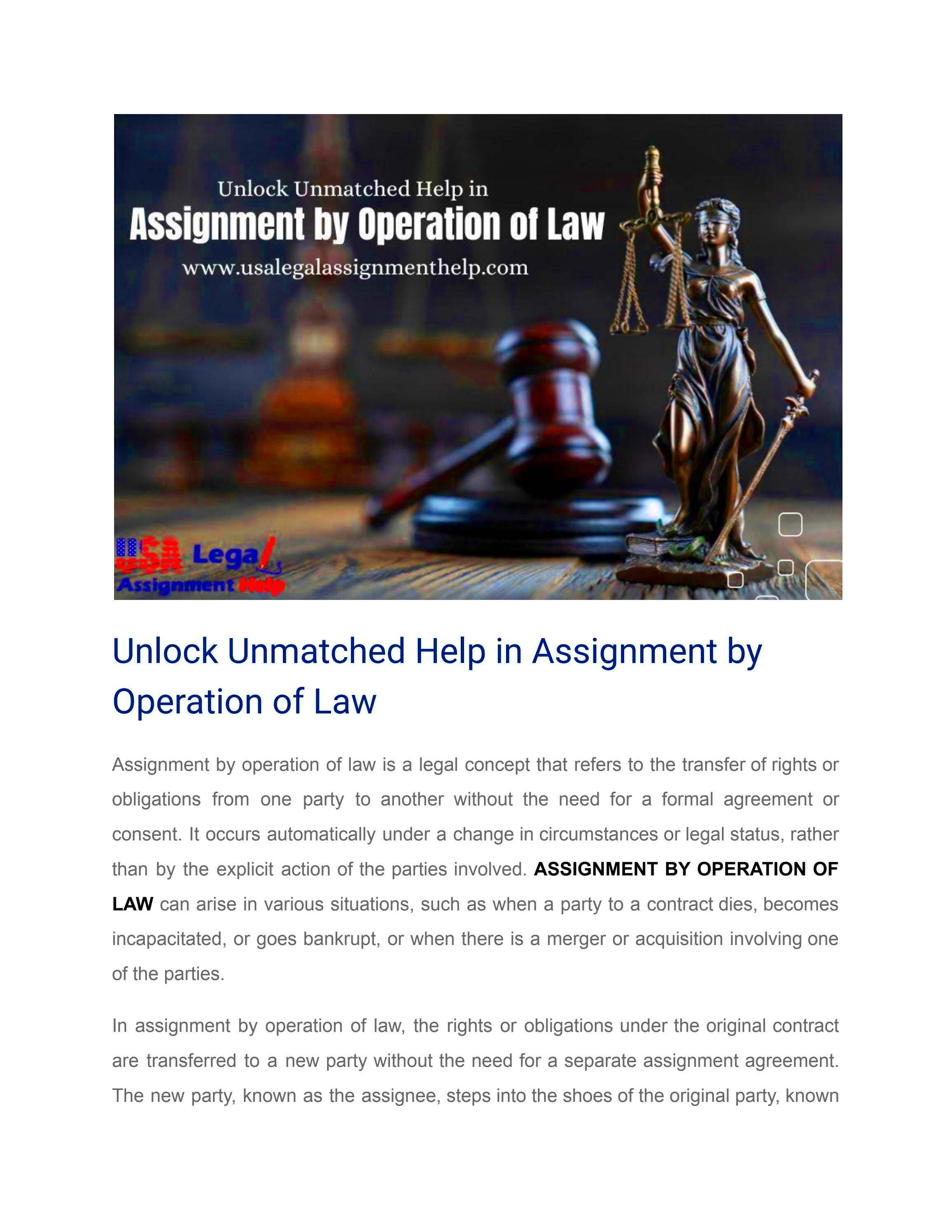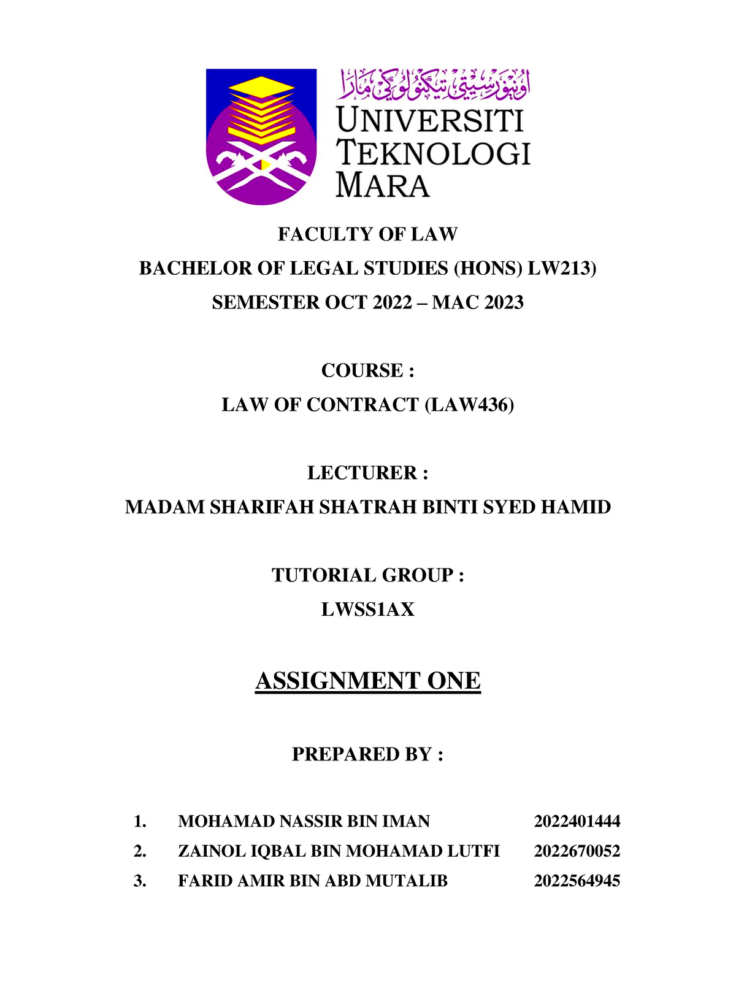What Does By Operation of Law Assignment Mean
When dealing with legal matters, terms can get quite complex. One such term is “By Operation of Law Assignment.” This concept plays a significant role in various legal situations, particularly when it comes to transferring rights or obligations. In simple terms, it refers to situations where the law automatically assigns rights or duties without the need for an explicit agreement between parties. Understanding this concept is crucial for anyone navigating legal frameworks.
Understanding the Concept of By Operation of Law

By Operation of Law is a legal principle that allows certain rights and obligations to transfer automatically when specific conditions are met. This can happen due to statutes, regulations, or court decisions. Here are a few key points to understand:
- Automatic Transfer: Rights or duties transfer without any action needed from the parties involved.
- Legal Framework: Governed by laws rather than personal agreements, making it an essential part of legal processes.
- Common Situations: Often occurs in cases like inheritance, bankruptcy, and property transfers.
This principle ensures that rights and obligations are clear and that they continue to exist, even if the parties involved do not actively manage the transfer. By understanding this concept, individuals can better navigate situations where their rights or duties might change without their explicit consent.
Types of By Operation of Law Assignments

There are various types of By Operation of Law Assignments, each applicable in different legal scenarios. Here are some common types:
| Type | Description |
|---|---|
| Inheritance Assignments | Transfer of assets automatically to heirs upon death. |
| Bankruptcy Assignments | Creditors may automatically gain rights to certain assets when an individual files for bankruptcy. |
| Property Transfers | Automatic transfer of property rights upon marriage, divorce, or death. |
| Legal Judgment Assignments | Rights to receive payment may automatically transfer to a creditor after a court ruling. |
Each type serves a specific legal purpose, making it essential for individuals to understand how these assignments may affect their rights and responsibilities. Being aware of these categories can help you prepare for any legal situations that may arise.
Importance of By Operation of Law Assignments in Legal Transactions
By Operation of Law Assignments are crucial in ensuring smooth legal transactions. They simplify complex processes, providing clarity and efficiency in various situations. Here are some reasons why they hold such importance:
- Streamlined Processes: These assignments eliminate the need for lengthy negotiations, making transactions faster and more efficient.
- Clarity of Rights: By automatically transferring rights and obligations, everyone involved knows exactly what to expect.
- Protection of Interests: They protect the rights of parties by ensuring that legal obligations are fulfilled even when circumstances change.
- Facilitation of Transfers: Whether it’s property, debts, or other legal rights, these assignments help facilitate smoother transfers during events like inheritance or bankruptcy.
Understanding the importance of By Operation of Law Assignments can empower individuals and businesses to navigate legal frameworks effectively, ensuring that their interests are safeguarded.
How By Operation of Law Assignments Work
By Operation of Law Assignments work through established legal principles and statutes. Here’s a breakdown of how this process unfolds:
- Legal Framework: The law outlines specific conditions under which rights and obligations automatically transfer. For example, in many jurisdictions, a spouse may automatically inherit property when one partner passes away.
- Triggering Events: Certain events or circumstances trigger these assignments, such as death, bankruptcy, or marriage. Once these events occur, the transfer of rights is automatic.
- No Need for Consent: Unlike regular contracts, parties do not need to consent to the transfer. The law mandates the change, ensuring that the transfer happens even if parties are unaware.
This automatic mechanism helps prevent disputes and ensures that legal rights remain intact, providing a level of security for individuals involved in transactions.
Legal Implications of By Operation of Law Assignments
By Operation of Law Assignments carry significant legal implications that individuals must be aware of. Understanding these implications helps in managing rights and obligations effectively:
- Irrevocability: Once a By Operation of Law Assignment occurs, it is typically irreversible. For example, if a property is transferred through inheritance, the original owner’s rights are permanently extinguished.
- Liability Issues: Individuals might find themselves liable for obligations they did not explicitly agree to. For instance, when inheriting debts along with assets, the heir may be responsible for those debts.
- Legal Documentation: In some cases, formal documentation may still be required to clarify the transfer, especially in real estate transactions.
- Potential Conflicts: Disputes may arise if parties are unaware of their rights under these assignments. Therefore, understanding one’s legal standing is essential.
Being informed about these implications can help individuals navigate potential challenges and protect their interests in legal matters.
Common Misconceptions About By Operation of Law Assignments
Understanding By Operation of Law Assignments can be tricky, and several misconceptions often arise. These misunderstandings can lead to confusion in legal transactions. Let’s clear up some common myths:
- Myth 1: By Operation of Law Assignments require a written agreement.
Fact: These assignments happen automatically by law, so no written consent is necessary. - Myth 2: All transfers of rights are considered By Operation of Law.
Fact: Not every transfer is automatic; some require explicit agreements, such as contracts. - Myth 3: By Operation of Law Assignments only apply to inheritance.
Fact: They can apply to various situations, including bankruptcy and property transfers. - Myth 4: Once an assignment occurs, the parties have no responsibilities.
Fact: Parties may still have legal obligations that they need to fulfill, even after a transfer.
Clearing these misconceptions helps individuals better navigate their rights and responsibilities in legal matters, leading to more informed decisions.
FAQs About By Operation of Law Assignments
Here are some frequently asked questions regarding By Operation of Law Assignments. These answers can help clarify common doubts:
| Question | Answer |
|---|---|
| What triggers a By Operation of Law Assignment? | Events such as death, bankruptcy, or marriage can trigger these assignments. |
| Can a By Operation of Law Assignment be revoked? | Generally, no. Once it happens, it is often irreversible unless specified by law. |
| Do I need legal representation for these assignments? | While it’s not mandatory, having legal guidance can help clarify rights and obligations. |
| How do I know if I’m affected by one? | Consulting with a lawyer can help determine if you have rights or obligations under this principle. |
These FAQs address some of the most common concerns and provide insight into how By Operation of Law Assignments function in legal settings.
Conclusion on By Operation of Law Assignments
In conclusion, By Operation of Law Assignments are vital legal mechanisms that ensure rights and obligations transfer automatically under specific circumstances. Understanding this concept helps individuals navigate legal transactions more effectively. By recognizing the importance, functionality, and common misconceptions surrounding these assignments, you can protect your rights and responsibilities better. Whether dealing with inheritance, property transfers, or bankruptcy, being informed empowers you to make sound legal decisions and mitigate potential disputes. Always consider consulting with a legal expert if you’re unsure about how these assignments may impact your situation.


